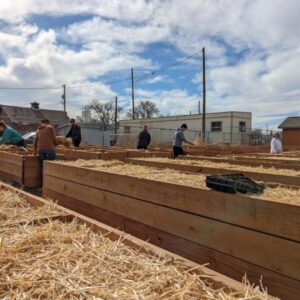By Miranda Ericksen
Big things are blooming in 2023 for Huerta Urbana, the agricultural social enterprise operated by the Focus Points Family Resource Center.
Not only is the 3-year-old organization growing food and flowers to distribute to the local community, it’s expanding its goals for the new year. Huerta Urbana organizers said they want to double their production from 2,000 pounds of food to 4,000, and they intend to distribute 175 weekly “bounty boxes” of around 6 pounds of produce each for families with children up to 5 years old.
“Huerta Urbana had just 1,500 square feet of growing space during the inaugural 2019 year, and we are now operating on 87% of an acre for the 2023 season,” program director Seynabou Sohai said.
The program, designed in an “earn as you learn” structure, provides opportunities for participants to gain skills and education required to start their own small farms, and they are paid a fair market wage for their time. This allows participants to establish strong foundations for success, as they don’t have to sacrifice wages in order to learn new skills. Each participant is paid a stipend, and the three-year program is tuition-free.
“Exploitation is rampant in this industry, and we designed the curriculum to ensure that participants have industry-relevant tools to leverage for more competitive wages,” Sohai said.
In the first year of the program, participants gain access to the Colorado State University business management and finance curriculum, as well as an in-house farmer’s market and construction lessons from the Colorado Home Building Academy.

The construction piece may seem out of place, but when participants are able to build a portfolio of marketable skills, like operating equipment or repairing barns, fences or garden beds, they increase their earning potential far beyond less-skilled farm workers, Sohai said.
Throughout the second year, the participants continue to learn about farmer’s markets, but they also continue to broaden their skills through controlled-environment farming and apiculture, also known as beekeeping. The first graduating class, consisting of a mother-daughter team focusing on growing cut flowers, will finish its third year in 2023.
Through a partnership with the Rocky Mountain MicroFinance Institute, the pair will work with a mentor to write a business plan and advocate for seed funding to launch their farm business with a potential storefront in 2024. Huerta Urbana describes itself as a 2GEN Farm Incubator, meaning that the current generation is taking subsequent generations into consideration.
For the participants, this means age-appropriate activities for their children, like learning how to preserve strawberries into jam and how to identify various plant species.
“It’s not uncommon to see children running around the farm. We wanted to ensure that lack of childcare was not a barrier to entry for our program,” Sohai said.
Because of this intimate collaboration, Sohai said participants “become a large family, and we are honored to be a part of watching people’s dreams come true and gain the ability to leave a legacy behind for their future generations.”
The program doesn’t just support Huerta Urbana participants, but the Globeville Elyria-Swansea community at large. As farmers learn how to grow food, operate farm businesses and participate in farmer’s markets, they also fill a crucial need in what is considered to be a food desert, far from traditional grocery stores.
The farmer’s market is structured with a “pay what you can” model, in which customers can use Supplemental Nutrition Assistance Program (SNAP) benefits or just pay whatever they can that week. In 2022, $34,000 of subsidies were used to ensure that the farmers were paid fair market value for the produce, thus supporting the farmers without passing the expense to the customers, who may not otherwise be able to afford locally grown produce.
Sohai is hopeful to expand up to $60,000 or more in 2023. Additionally, through a partnership with the Environmental Protection Agency, Huerta Urbana intends to build a solar farm that will generate enough electricity to power the farm, the Focus Points building and subsidize electricity for the 80216 ZIP code.
The intention behind the subsidy is to reduce energy bills by up to 20%, broadening the systems of support from Focus Points for the GES community.

Be the first to comment